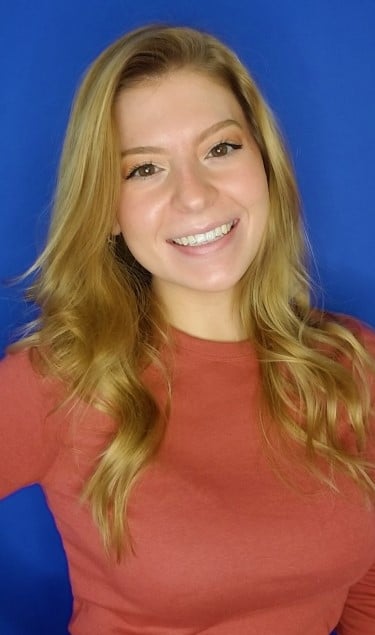 Meet Emily Agnello, a PhD student in the Kelch lab. In the lab, Emily uses her creativity to combine structural and biochemical methods to understand how viruses infect and propagate in their host cells. Emily is also our department’s MALS point-person, so you might seek her expert advice in the future.
Meet Emily Agnello, a PhD student in the Kelch lab. In the lab, Emily uses her creativity to combine structural and biochemical methods to understand how viruses infect and propagate in their host cells. Emily is also our department’s MALS point-person, so you might seek her expert advice in the future.
Emily is currently working with a hot-loving (thermophilic) bacteriophage, which is a virus that infects bacteria. Emily is following up on the recent discovery that proteins of the thermophilic bacteriophage self-assemble into heat-resistant spheres and tubes[JA1] . Equipped with this tool, Emily is studying basic principles of virus assembly, and engineering a range of functional ultra-stable nanoparticles, which can, for example, serve as vaccines. Last year, Emily was awarded a prestigious National Science Foundation (NSF) predoctoral fellowship for her work and ideas.
Emily is enthusiastic about many aspects of science and is involved in outreach activities, following her passion to make science more accessible to a broader community.
What’s the coolest thing about your research?
I love going to the EM facility to use the electron microscope, which allows me to look at proteins at high magnifications. It is crazy that we can see proteins and DNA so directly. Each time I am looking at proteins with the electron microscope, I am amazed by their beauty.
What set you on this trajectory of becoming a scientist?
I grew up in a school district where becoming a scientist is not a common career path. Most of my friends from high school chose different careers and I didn’t know anyone with a PhD. For the longest time, I did not consider becoming a scientist myself. In my high school district, teachers had to put in extra effort to keep the kids motivated to just show up for school. Getting into college was a big deal. During high school, I was never encouraged by anyone to pursue a career in science. Nevertheless, I got into college, which really motivated me to go further.
Were there any setbacks to your trajectory? How did you overcome them?
When I went to college, I initially set out to major in chemistry as I love to solve puzzles. I failed the first chemistry class, which was a big shock at first. Everyone in class had taken advanced chemistry in high school, except for me, and no one was supportive of me closing this gap. This failure, however, pushed me to prove that I was nevertheless capable of succeeding in science.
What led you to your current position?
Later on, I switched to Biochemistry, because it seemed more application-based. This change inspired me to join a lab where I studied proteins involved in long-term memory. I got hands-on experience and learned how much fun it can be to solve scientific questions in the lab. Most importantly, with the principal investigator of this lab, I found an empathic mentor who really supported and inspired me. With her, I worked on my first outreach project, which was explaining scientific concepts in layman’s terms on BuzzFeed. We reached a broad audience including my friends at home. Working in this extremely supportive environment gave me the self-confidence to apply to grad school.
What’s one thing you would like to achieve with your research and scientific education?
I really like mentoring and teaching, and I want to help underprivileged kids to realize their own potential. No matter what I end up doing, I will therefore always work on scientific outreach projects. For example, I am currently working on a pamphlet to inform the broader public about the current COVID-19 vaccines.
Growing up in a rural school district fueled my passion for science outreach and communication. I am empathic towards the kids that don’t see many perspectives growing up. My goal is to bring higher level science into socially or economically disadvantaged school districts. It is important to make science more accessible to everyone and to give everybody different career perspectives, which is why I am planning to share my motivation for science with the students.
My passion for science outreach fits really well in the Kelch lab, which received an award from the National Science Foundation (NSF) to bring UMass Chan graduate students into local high schools. Here, I will be given the change to explain to high schoolers how the abstract concepts of the classroom are applied in a biomedical research setting using real life examples. Moreover, I will have the opportunity to mentor individual high school students directly in the lab.
Why did you choose this department at UMass Chan?
When I applied to UMass Chan, I immediately noticed the sense of community and how happy and friendly people are. Having experienced a supportive lab situation during my undergraduate research, I set out to find a similarly supportive environment, which I found at UMass Chan.
What do you like about UMass Chan?
Here, I don’t feel any pressure to be one way or another. What fits your lifestyle and interests is encouraged. We also have a Center for Biomedical Career Development, which helped me to see that there are many different career paths. It is great to have many options.
What do you like to do when you are not doing research? Favorite Hobbies?
I enjoy having a creative outlet, where I can get away from the hard questions and where there is no wrong answer. I love painting, and music – I sing, and play banjo and the keyboard.